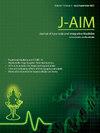In vitro anti-inflammatory and in silico anti-viral assessment of phytoconstituents in polyherbal Ayurvedic formulation ‘Arogyamrita Kwath’
IF 1.9
Q3 INTEGRATIVE & COMPLEMENTARY MEDICINE
引用次数: 0
Abstract
Background
Arogyamrita Kwath (AMK) is a polyherbal decoction comprising ten medicinal plants, viz., Albizia lebbeck, Andrographis paniculata, Tinospora cordifolia, Adhatoda vasica, Solanum xanthocarpum, Curcuma longa, Glycyrrhiza glabra, Terminalia bellirica, Withania somnifera and Trachyspermum ammi. The plants of the AMK formulation are traditionally used for the treatment of inflammation and respiratory ailments, but no scientific evidence has been reported so far for this formulation.
Objectives
To evaluate anti-inflammatory activity of AMK formulation in vitro and its fractions and to predict in silico anti-viral activity of identified potential phytoconstituents.
Materials and methods
The MTT cell cytotoxicity assay, nitric oxide (NO) inhibition assay and cytokines assay were carried out at concentrations 100 and 200 μg/mL. The phytoconstituents were identified by UPLC-PDA and UPLC-HRMS analyses. For pharmacoinformatics study molecular docking and molecular dynamics methods were used.
Results
The study revealed that AMK significantly inhibited NO in comparison to dexamethasone (100 μg/mL) and pro-inflammatory cytokines in RAW264.7 cells. The three fractions, n-hexane, EtOAc and n-BuOH prepared from the AMK formulation were non-cytotoxic against RAW264.7 murine macrophage cells during MTT cytotoxicity assay and showed satisfactory results during cytokines assay. Ethyl acetate fraction contains active phytoconstituents in appreciable quantities. 16 phytoconstituents have been identified by UPLC-HRMS analysis in the formulation and four phytocompounds were quantified by UPLC-PDA. Molecular dynamics study helped in identifying two macromolecular targets (viral replicase and the membrane protein), which are relatively more important.
Conclusion
In the present study, anti-inflammatory activity of AMK was evaluated and the claimed anti-viral property was re-confirmed by molecular modelling in this work. The results clearly established that AMK showed remarkable anti-inflammatory and anti-viral activities.
阿育吠陀复方“Arogyamrita Kwath”植物成分体外抗炎和计算机抗病毒评价
背景Arogyamrita Kwath(AMK)是一种多草药煎剂,由十种药用植物组成,即Albizia lebbeck、穿心莲、Tinospora cordifolia、Adhatoda vasica、Solanum xanthocarpum、Curcuma longa、Glycyrrhiza glabra、Terminalia bellirica、Withania somnifera和Trachyspermum ammi。目的 评估 AMK 制剂及其馏分的体外抗炎活性,并预测已确定的潜在植物成分的硅学抗病毒活性。材料和方法 在浓度为 100 和 200 μg/mL 时进行 MTT 细胞毒性试验、一氧化氮(NO)抑制试验和细胞因子试验。通过 UPLC-PDA 和 UPLC-HRMS 分析鉴定了植物成分。研究结果表明,与地塞米松(100 μg/mL)和 RAW264.7 细胞中的促炎细胞因子相比,AMK 能显著抑制 NO。在 MTT 细胞毒性试验中,AMK 配方制备的正己烷、乙酸乙酯和正丁醇三种馏分对 RAW264.7 小鼠巨噬细胞无毒性,在细胞因子试验中也显示出令人满意的结果。乙酸乙酯部分含有数量可观的活性植物成分。通过 UPLC-HRMS 分析,确定了制剂中的 16 种植物成分,并通过 UPLC-PDA 对 4 种植物化合物进行了定量。分子动力学研究帮助确定了两个大分子靶标(病毒复制酶和膜蛋白),这两个靶标相对来说更为重要。结果清楚地表明,AMK 具有显著的抗炎和抗病毒活性。
本文章由计算机程序翻译,如有差异,请以英文原文为准。
求助全文
约1分钟内获得全文
求助全文
来源期刊

Journal of Ayurveda and Integrative Medicine
INTEGRATIVE & COMPLEMENTARY MEDICINE-
CiteScore
4.70
自引率
12.50%
发文量
136
审稿时长
30 weeks
 求助内容:
求助内容: 应助结果提醒方式:
应助结果提醒方式:


